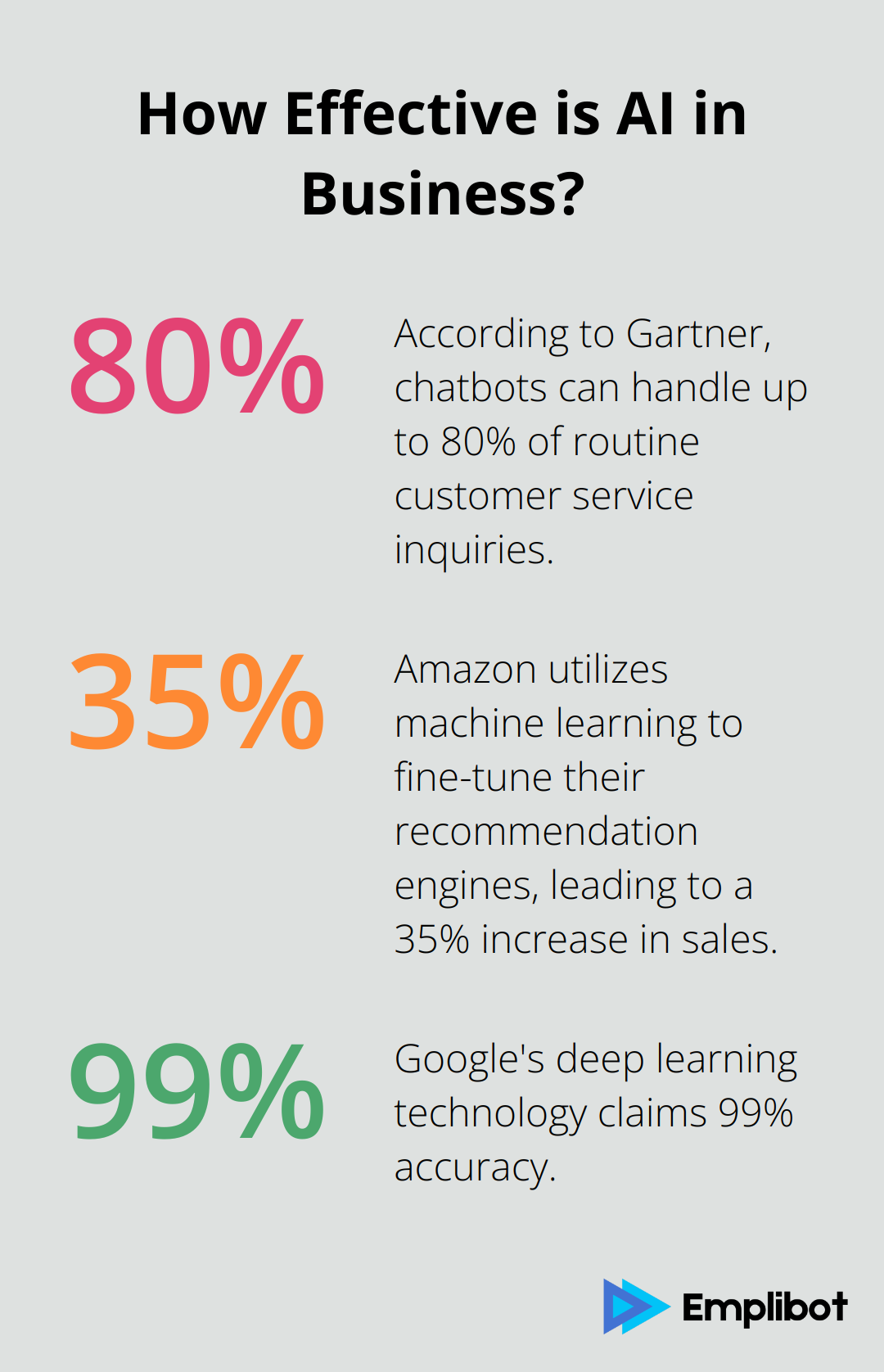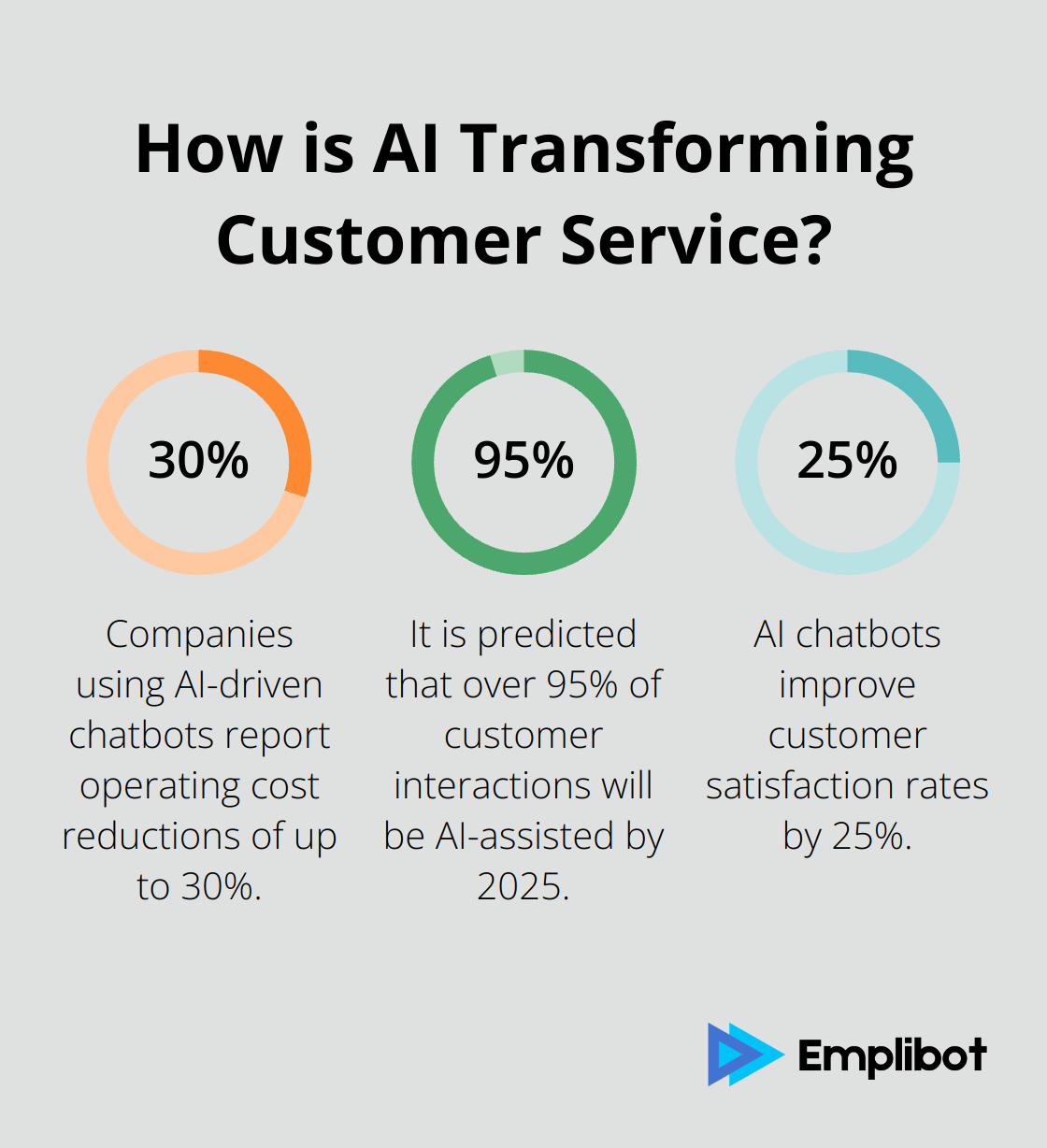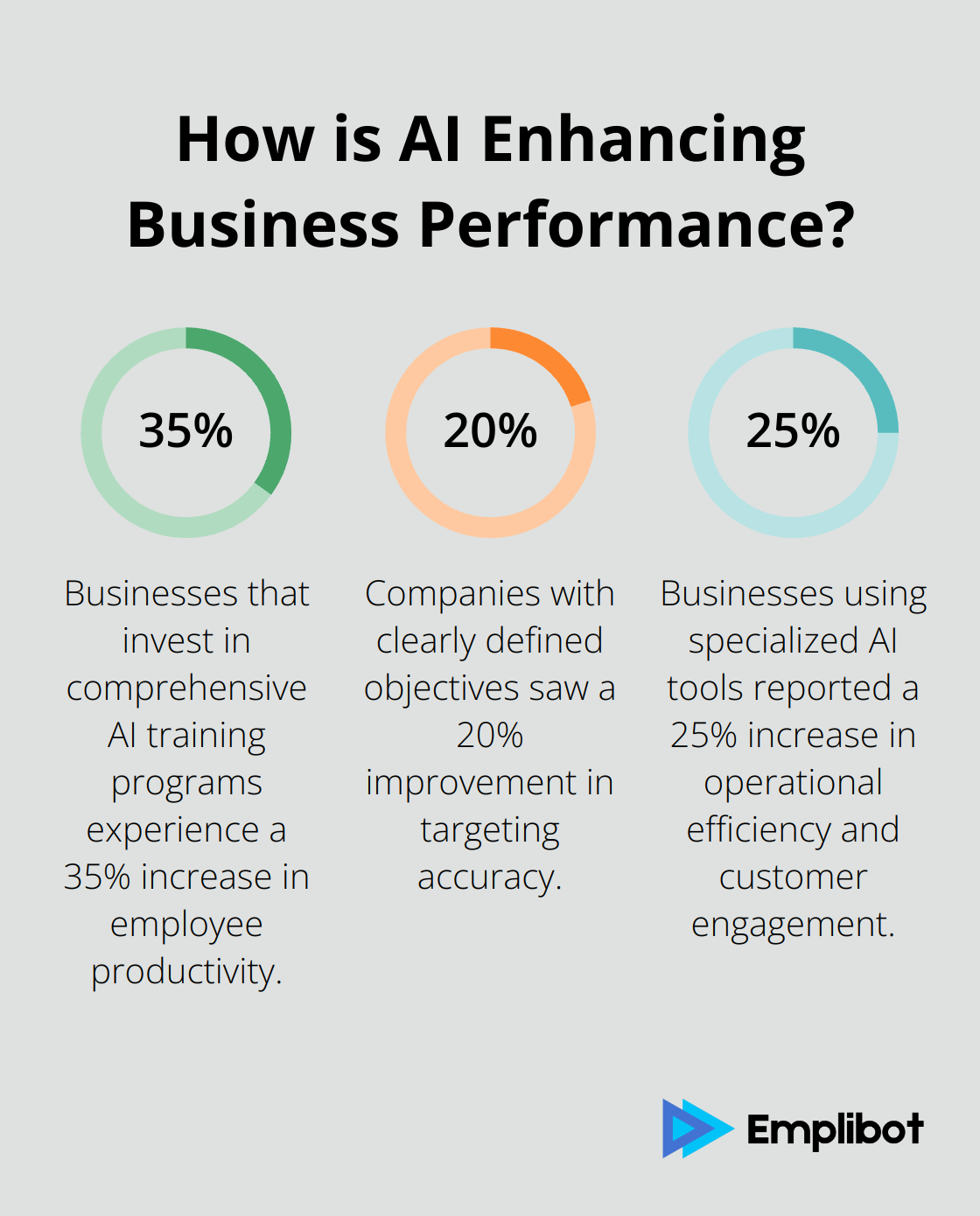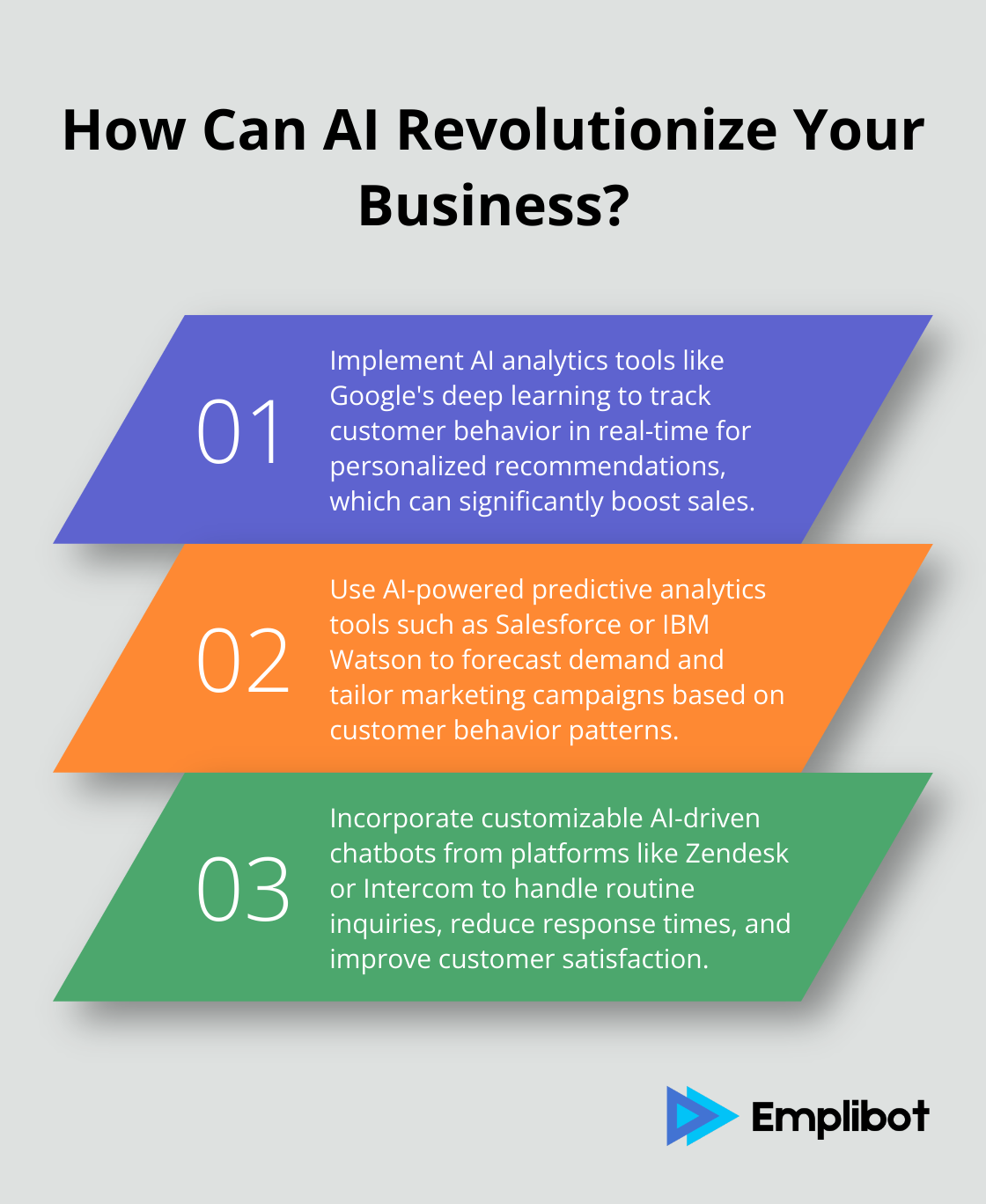Artificial intelligence is transforming how businesses interact with their customers.
From personalized recommendations to efficient customer support, AI offers multiple ways to enhance customer engagement.
Here at Emplibot, we’ve seen firsthand how companies can benefit from these innovative technologies.
Contents
ToggleHow Does AI Improve Customer Engagement?
Artificial intelligence is revolutionizing the way businesses engage with their customers, offering practical tools that deliver substantial benefits. Companies leveraging AI are already witnessing up to a 10% increase in customer satisfaction and retention rates.
Personalized Recommendations
AI excels at providing customers with personalized recommendations based on their browsing and purchasing history. Netflix, for example, generates $1 billion annually from its AI-driven recommendations. Businesses can integrate AI algorithms to analyze customer data and predict what products or services a particular customer might be interested in. This not only improves the customer experience but also significantly boosts sales.

To implement personalized recommendations effectively, companies should use AI analytics tools that track customer behavior and preferences in real-time. Tools such as Google’s deep learning technology, which claims 99% accuracy, can help narrow down the most relevant recommendations for each user. Moreover, businesses like Amazon utilize machine learning to fine-tune their recommendation engines, leading to a 35% increase in sales.
Predictive Analytics for Customer Behavior
Understanding customer behavior is crucial for any business. AI-powered predictive analytics can identify trends and predict future behaviors with high accuracy. Research has shown that companies using predictive analytics are 2.9 times more likely to report revenue growth.
By analyzing large datasets, AI helps businesses identify patterns that human analysts may not easily see. With these insights, companies can forecast demand, tailor marketing campaigns, and anticipate customer needs, thereby improving overall engagement. Predictive analytics tools, such as those offered by Salesforce or IBM Watson, provide actionable insights that drive personalized marketing efforts.
For in-depth insights, you can explore more about predicting customer behavior.
Efficient Customer Support with Chatbots
Chatbots have become an essential part of customer service strategies. They offer immediate, 24/7 support, drastically reducing response times. According to Gartner, chatbots can handle up to 80% of routine customer service inquiries, freeing up human agents to manage more complex issues.
The efficiency of chatbots is evident, considering that by 2025, more than 95% of customer interactions are expected to be AI-assisted. Companies utilizing AI-driven chatbots report a 30% reduction in operational costs and a 25% improvement in customer satisfaction. For practical implementation, consider AI solutions from platforms like Zendesk or Intercom, which offer customizable chatbots that seamlessly integrate into existing workflows.
AI’s role in customer support is further elaborated in this guide on chatbots.
AI undeniably transforms customer engagement, making interactions more personalized, anticipatory, and efficient. Integrating AI tools and technologies not only meets but exceeds customer expectations, paving the way for sustained business growth.
What Are the Best AI Tools for Engagement?
Artificial intelligence offers a powerful suite of tools and technologies to boost customer engagement. Here’s how businesses can maximize their potential.
Chatbots and Virtual Assistants
Chatbots and virtual assistants revolutionize customer interactions by offering instant, around-the-clock support. These tools are indispensable for handling routine inquiries, allowing human agents to focus on more complex issues. For instance, companies using AI-driven chatbots report operating cost reductions of up to 30%. Additionally, platforms like Zendesk or Intercom provide customizable bots that can seamlessly integrate with existing customer support workflows.

The efficiency of chatbots is further highlighted by their ability to manage up to 80% of routine tasks. With the prediction that over 95% of customer interactions will be AI-assisted by 2025, businesses can’t afford to ignore this technology. AI chatbots not only improve customer satisfaction rates by 25% but also significantly enhance operational efficiency.
Customer Relationship Management (CRM) Systems
CRM systems powered by AI offer deeper insights into customer behavior and preferences. By integrating AI, these systems become more adept at predicting customer needs and personalizing marketing efforts. Companies using AI in their CRM systems have seen a 15-20% increase in sales productivity.
Salesforce, for instance, incorporates AI to analyze customer interactions and offers predictive insights. This enables businesses to tailor their marketing strategies effectively. AI-driven CRMs help in identifying high-value leads and automating follow-ups, which considerably boosts engagement levels.
Sentiment Analysis Tools
Understanding customer sentiment is essential for improving engagement strategies. Sentiment analysis tools, powered by AI, can analyze customer feedback from multiple channels, such as social media, reviews, and customer support tickets. Research shows that businesses using sentiment analysis experience a 5-10% increase in customer retention rates.
These tools dissect text to gauge the customer mood and provide actionable insights. Companies like Lexalytics and MonkeyLearn offer advanced sentiment analysis tools that integrate well with other systems. Real-time sentiment tracking allows businesses to respond promptly to customer feedback, thus enhancing engagement and loyalty.
For more details on how to leverage sentiment analysis, check out this guide on sentiment analysis tools.
Integrating these AI-driven tools not only meets but exceeds customer expectations. Businesses that adopt these technologies find themselves at a competitive advantage, offering personalized, efficient, and responsive customer interactions.
How Can AI Transform Your Customer Engagement?
To make the most out of AI in customer engagement, you need a strong plan and clear steps.
Define Your Objectives and KPIs
Before diving into AI, set specific goals and key performance indicators (KPIs). This helps measure success and guides your strategy. Objectives might include increasing customer satisfaction by 15% or reducing support response time by 30%. Establishing metrics like Net Promoter Score (NPS) or Customer Satisfaction Score (CSAT) will allow you to gauge the effectiveness of your AI initiatives.

A study by McKinsey highlighted that companies with clearly defined objectives saw a 20% improvement in targeting accuracy. This shows the importance of defining what success looks like for your business.
Select the Appropriate AI Tools
Choosing the right AI tools is pivotal. Not all tools are created equal, and selecting one that fits your business needs can make a significant difference. For instance, a CRM system integrated with AI, such as Salesforce, can help in automating follow-ups and tracking customer interactions. AI tools like Zendesk or Intercom are excellent for setting up chatbots that handle a significant portion of customer inquiries.
A Gartner report found that businesses using specialized AI tools reported a 25% increase in operational efficiency and customer engagement. This further underscores the value of selecting tailored AI solutions.
Train Staff and Monitor Performance
Technology alone isn’t enough. Staff must be well-trained to use AI tools effectively. Training should cover not only how to use these tools but also how to interpret data insights and interact with customers more efficiently. According to a Stanford study, businesses that invest in comprehensive AI training programs experience a 35% increase in employee productivity.
Continuous monitoring and iteration are crucial. Regularly review KPIs and adjust strategies based on performance data. Many AI tools offer real-time analytics, allowing you to make timely decisions. For tips on real-time personalization, refer to this guide on personalization with AI.
Taking these steps ensures that you can leverage AI to create meaningful interactions with your customers, leading to improved satisfaction and retention rates.
Conclusion
Artificial intelligence offers transformative benefits for customer engagement, from personalized recommendations to efficient customer support. Businesses that effectively harness AI see significant improvements in customer satisfaction, retention rates, and operational efficiency.

For instance, companies have reported up to a 10% increase in satisfaction and retention rates. Netflix generates $1 billion annually through AI-driven recommendations, while predictive analytics can increase revenue growth by 2.9 times. Chatbots handle up to 80% of routine customer inquiries, reducing operational costs by 30% and improving satisfaction by 25%.
Successful implementation requires setting clear objectives and KPIs to measure success, selecting the right AI tools, and training staff effectively. Companies that invest in comprehensive AI training programs see a 35% increase in employee productivity.
Incorporating AI into customer engagement strategies not only meets but often exceeds customer expectations. Businesses leveraging AI can offer personalized, predictive, and efficient interactions, positioning themselves at a competitive advantage.
Enhancing your customer engagement strategy with AI doesn’t have to be daunting. We at Emplibot can help. Emplibot publishes SEO-friendly articles to your WordPress site 100% automatically, including keyword research, images and internal linking. Discover more about how Emplibot can assist in building your blog and enhancing your digital presence.










 Rated Excellent 4.5
Rated Excellent 4.5